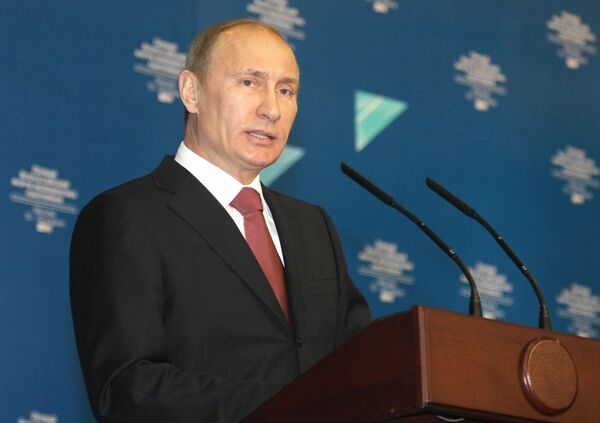Russia's premier said on Wednesday that negative demographic trends had been overcome, but hospitals were still in need of repair, the management staff was oversized, and he offered financial and other methods of addressing these sore points.
"We have curbed the destructive [demographic] trends... But despite all our painstaking efforts, the population in the country has shrunk by 500,000 people over the past five years," Putin said in his address to a forum of medical workers in Moscow.
For comparison, the premier cited the demographic statistics of the turbulent 1990s when Russia, a country of 143 million, lost 800,000 people annually.
He said life expectancy had increased by four years, birth rate by 19% and the death rate had dropped by 11% since 2005, but added that Russia was still behind Europe in these statistics.
"Life expectancy in our country is 8-10 years lower than in neighboring European countries, the death rate from cardiovascular diseases is 4-5 times higher," Putin said.
The premier said a quarter of Russian hospitals were in very poor conditions, adding that 30% had no running hot water, let alone medical equipment, whose term of service is often expired.
All this added to meager wages and excessive management staff contributes to the poor quality of health care in Russia, he said.
Solution
But the premier said the quality of medicine could be improved through better funding, including from regional budgets, management layoffs, more flexible conditions for interns and a new law on electronic databases.
"I am 100% certain that we have made the right thing by setting up a financial base for regional programs, and now we can provide an additional 460 billion rubles [$16 billion]," he said.
The premier also said the government would earmark nearly 800 billion rubles ($28 billion) for the national health care project in the next two years. Putin launched the project in 2005 to improve the health of the nation and the quality of medical services.
He said 11 maternity centers and seven high-tech medical centers had been built across the country in the past six years to care for over a million Russians.
The government will also allocate 30 billion rubles ($1 billion) to encourage health care development in the regions.
Another obstacle stalling progress in the medical sphere is that interns have to receive their compulsory post-graduate training at the same university where they studied, which means that many of them marry and settle down away from home. Their financial status also leaves much to be desired, Putin said.
He gave instructions to the Health Care, Finance and Education ministries to remedy the situation.
Another headache is the excessive number of top-level managers in health care, which takes away money that could be paid to regular doctors and nurses whose efforts are more valuable.
He said Russia had 28,000 chief doctors and their deputies last year, whose wages cost the budget 15 billion rubles ($530 million).
"I think the number of medical officials in health care has expanded enormously and it has to be reduced to sensible levels and correspond to real needs in this area," the premier said.
He also said the amount of paperwork doctors had to do delayed medical aid and made it less efficient, and he called for introducing electronic databases, including on patient medical backgrounds.
Health Minister Tatyana Golikova said a relevant law had been drafted and sent for the government's consideration.
Another interesting solution offered by the premier was to introduce annual ratings of clinics and hospitals and insurance companies based on patients' opinions.
"I suggest that we publish annual ratings of medical institutions and insurance companies with due account of patients' assessment," he said.
MOSCOW, April 13 (RIA Novosti)


